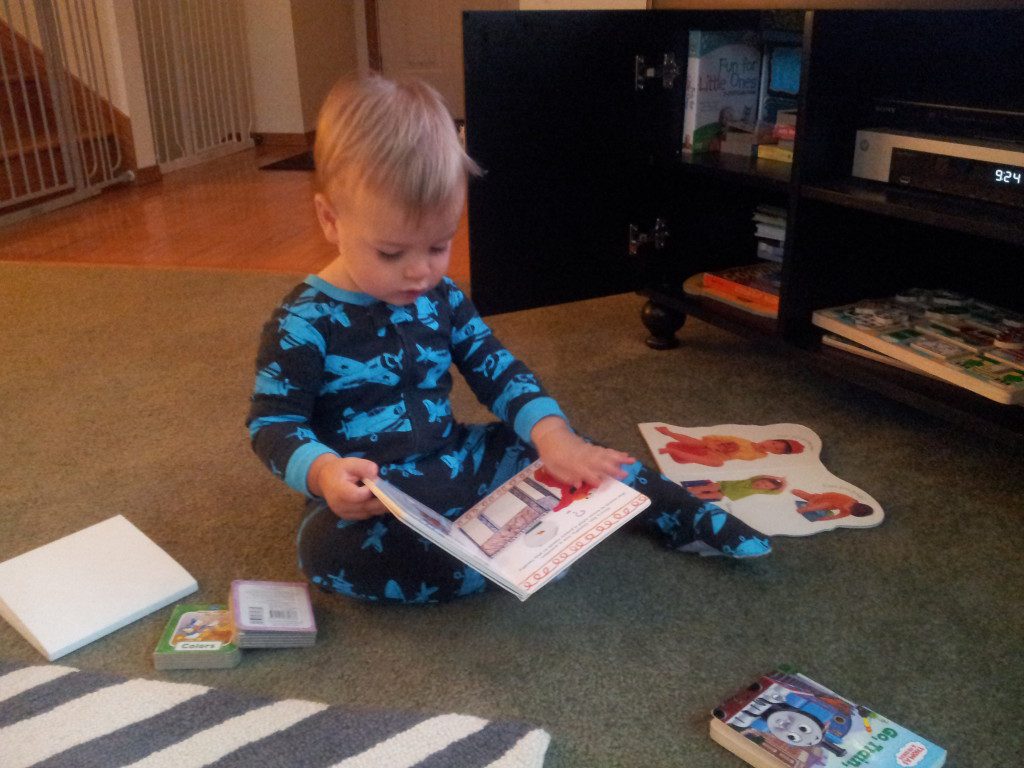A year ago, my son was about to turn 2 and had never said the word “Mama.”
Or “Dada.” Or “ball.” Or “up.” Mason was silent and stoic, and we were nervous.
 Our pediatrician frowned at the communication questionnaires I filled out and recommended speech therapy. I frantically Googled things like “2 year old won’t talk” and tried to ignore the voice in my head.
Our pediatrician frowned at the communication questionnaires I filled out and recommended speech therapy. I frantically Googled things like “2 year old won’t talk” and tried to ignore the voice in my head.
We did everything we could think of to get him talking. We talked and read to him constantly, we bought flashcards with bright pictures on them, we implemented ideas from the book our pediatrician recommended.
I remember being with Mason at the library and chatting with another mom, whose son was 9 months younger than mine and talking up a storm. I was so envious of their interactions. “You’re right, that is a ball! Yes, a blue ball!” When she asked how old my son was and I told her, she looked confused. (Or maybe I just imagined it.)
During a parent-teacher conference at Mason’s daycare, I saw two words on his development report that I’ll never forget. Under communication skills: “extremely delayed.” I went home in tears.
Today, Mason is a few months from his third birthday, and he’s a total chatterbox. His vocabulary includes hundreds of words–too many to count, and more every day. His pronunciation isn’t as sharp as some kids’, and his sentences aren’t quite as sophisticated, but you’d never guess that a year ago he was only babbling.
If you’re the mom of a quiet toddler: be encouraged.
We all know that every child is different, and that they all learn at their own pace–or at least, we “know” that–but those darned milestones have a way of shaking our faith. (Unless our kids are meeting them early, in which case: look how smart they are!)
And of course, we ALL have friends whose kids are doing things sooner/better/easier…
One thing I’ve learned is to to recognize when a behavior is more a reflection of my son’s personality than his development or my parenting. Even though he’s talking now, Mason is still a reserved kid by nature. It takes him awhile to warm up to new environments and new people, and until he does that, he’s quiet. (I know: not the worst thing in the world for a toddler!)
Oh, and we did get that speech therapist, for a few months. She was wonderful with Mason, but she helped me even more. She had complete confidence in my son, when my own was faltering, and she gave me things to do so I could feel like I was “helping.”
In the end, though: my son talked when he was ready. Not a second sooner.
If you’re the mom of a late talker, and you find yourself wanting to feel like you’re helping, here are a few ideas to try. (This is a mix of tips and tricks from our speech therapist and our own experiences–but as always, remember that every child responds to things differently!)
Get your child’s ears checked
I was extremely
reluctant to do this, since Mason seemed to hear fine–he reacted to sounds, responded to his name, etc. But even a small amount of hearing loss can impair speech development. (I’ve read that it’s like being underwater–imagine trying to learn a foreign language that way!)
In the end, a visit to the audiologist did detect some hearing loss, and the doctor recommended ear tubes. Mason didn’t start speaking until several months after the tubes, so we’re not sure how much we can credit them with his progress, but we definitely didn’t regret getting them. (Bonus side effect: no ear infections!)
Figure out what motivates your child
This was our speech therapist’s very first piece of advice. The idea is to teach kids that communication helps them get things they want–it’s not just for pleasing Mom and Dad. So instead of encouraging them to talk just for the sake of talking (“can you say Mama?”), save the prompting for things they care about.
Food and drink are common motivators. If your child wants a drink, withhold the cup a little bit and see if he’ll say “milk” (or whatever) to get it.
Encourage interaction through sounds
Sounds are precursors to speech and a great place to start. Talking about animal sounds is perfect for this, especially if your child is into animals.
Our son was into one thing, and one thing only: cars. So, our speech therapist encouraged as much vroom-vrooming and beep-beeping as possible.
Let them finish
Mason’s first word was “go,” and we got him to say it by prompting him with the phrase “ready, set, go.” We started using the phrase while playing with his cars, and once we were sure he was familiar with it, we’d say “ready, set…” and then wait. We did this over and over and over, and eventually, it clicked.
This method works great with books too–especially rhyming ones. Once you’ve read the child the book several times, try pausing before the last word of an easy sentence to see if he’ll fill in the blank. We still do this all the time with Mason, and he loves the opportunities to participate.

Get the child’s attention
We were coached to come down to Mason’s eye level and wait until he looked at us to speak (when prompting him). It was amazing how often we weren’t taking the time for this simple step.
Wait longer than usual for responses
We noticed that if we gave Mason a prompt and he didn’t make an effort to respond right away, we’d keep repeating the prompt. “Up? Can you say up? Do you want up?” But the problem wasn’t that he hadn’t heard us.
Eventually, we learned to wait an uncomfortable amount of time after a prompt, to give him plenty of time to respond if he wanted to.
Keep the pressure off
Mason used to get (actually, still gets) stage fright if he felt like he was being put on the spot. Sometimes, when he’d be playing alone, I’d overhear him making car sounds and bud in with comments like, “that’s right, buddy, vroom-vroom!” When he’d realize I’d been listening, he’d look flustered and immediately clam up. #fail!
Make a personalized picture book
Mama and Dada are often kids’ first words because they’re easy to say. But for some kids, the in-their-face interaction that’s usually happening when they’re taught those words can be intimidating. It can be helpful to encourage speech while focusing on something else–like a book.
We got a blank board book, like this one, and filled it with pictures of my husband and I, as well as all of Mason’s favorite things: a car, a truck, Elmo, and Mickey, plus some easy-to-say words like dog and ball. He loved it!
Don’t let the milestone police get you down
In retrospect, I wish I wouldn’t have let my pediatrician’s concerns get to me so much. I understand the importance of early intervention in some cases, but my son wasn’t showing any other concerning signs, and I had so many people (including the speech therapist) assuring me he’d catch up. Why was I so focused on the worst case scenario?
My final tip (and this applies to basically anything parenting-related): whatever you do, beware of Google!
To mimic what I heard many, many times during that phase: hang in there, Mama. Before you know it, your kid will be talking your ear off, and you’ll look back with fondness on those sweet, silent days.













This is so encouraging. Our grandson is 26 months old and only grunts. He understands even the most complicated instructions so I know hearing is good but it will be checked anyway. He just started a nursery school and he was a premature baby so that may have something to do with delayed speech. He will be evaluated by a speech therapist and I am hoping they will put the grownups at ease!
Thank you this was helpful
Thank you. Very reassuring to know I’m not the only one overtly worried. My LO is 27 months and only expresses herself by pointing or taking ur hands to get what she needs.
Yes, same here. It’s been a year how is she now?
Really needed to read this. Thank you!!